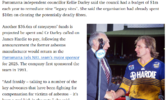The Eels’ renewing its major sponsorship with building materials company James Hardie has been labelled a “real kick in the guts” for asbestosis victims.
It’s prompted calls for the global company to financially assist Parramatta Council to clear asbestos in the area where its factory was based for decades.
Parramatta independent councillor Kellie Darley said the council had a budget of $1m each year to remediate nine “legacy sites”. She said the organisation had already spent $10m on clearing the potentially deadly fibres.
Another $36.6m of ratepayers’ funds is projected be spent and Cr Darley called on James Hardie to pay, following the announcement the former asbestos manufacturer would return as the
Parramatta Eels NRL team’s major sponsor for 2025. The company first sponsored the team in 1981.
“And frankly – talking to a number of the key advocates that have been fighting for compensation for victims of asbestos – it’s been a real kick in the guts,’’ she said.
Cr Darley said the council needed to find funds to clear asbestos from avenues apart from the state government.
“Why should we as council and the community be paying for the remediation?” she asked.
“To be taking the money from general reserves means we can’t be spending that money on something else.
“It is not our pollution, it is not our mess and we’ve been required to clean up … so I think it is financially irresponsible for us to be carrying that burden without seeking out other funding sources.”
About 4000 Australians die each year from asbestos exposure after the product – manufactured at the Camellia factory – was found to have caused diseases such as lung cancer and asbestosis among workers and their families for decades.
Asbestos Diseases Foundation of Australia president Barry Robson blasted the sponsorship.
He said it was “bad optics” to spend funds on an NRL team instead of victim compensation or remediation.
“It’s outrageous,’’ he said.
“Hardie’s are trying to get brownie points in the community – simple as that – but by having this sponsorship all it does is trigger bad memories for victims and their families.
“If Hardie’s have got this sort of money to splash out on a rugby league team sponsorship that money should be spent on a cure, because we lose 4000 Australians to asbestos-related diseases (each year).”
However, councillor Lorraine Wearne labelled it “ridiculous” for the council to identify funding sources to fix James Hardie sites.
She said other areas such as the Rosehill-Camellia site (which the government plans to turn
in to a mini city) were worse.
“Heavens above – we all know the tragedy of asbestos but it is not this council’s job to actually even be looking for methods of funding the restoration clearance of those sites,’’ Cr Wearne said.
After a rigorous debate, the council did not agree to request James Hardie to undertake remediation. Instead, council officers will provide an update on the remediation program at relevant sites.
A Parramatta Council spokeswoman said the organisation would meet with James Hardie soon.
“The Lord Mayor will be meeting with James Hardie’s President of Asia Pacific, John Arneil, in the coming weeks to understand the company’s plans for growth in western Sydney and opportunities to increase investment in the city,’’ she said.
A James Hardie spokesman did not answer questions about remediation, but said the company was “committed to the local community in which we operate”.
“James Hardie looks forward to engaging with the City of Parramatta specifically to discuss how our return as the major sponsor of the Eels could benefit council and the broader Parramatta community,’’ he said.
The spokesman said the company recognised its history up to the mid-1980s and James Hardie products were asbestos free in 2024.
“As at June 2024, James Hardie has provided approximately $2.2bn dollars to the Asbestos Injuries Compensation Fund to fund compensation payments, and will continue make contributions in accordance with the terms of the AFFA for as long as required,” the spokesman said.


www.abc.net.au


